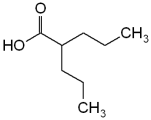Valproic acid
Valproic acid or 2-Propylpentanoic acid, is a chemical compound that has found clinical use as an anticonvulsant and mood-stabilizing drug, primarily in the treatment of epilepsy and bipolar disorder; but also used to treat migraine headaches and schizophrenia. In epileptics, valproic acid is used to control absence seizures, tonic-clonic seizures (grand mal), complex partial seizures, and the seizures associated with Lennox-Gastaut syndrome. more...
Related drugs include the sodium salt – Sodium valproate, and a combined formulation – Valproate semisodium.
Valproate is believed to affect the function of the neurotransmitter GABA (as a GABA transaminase inhibitor) in the human brain.This principle was used by Ashoka Jahnavi-Prasad when he suggested that sodium valproate could be a safer alternative to lithium salts in treatment of bipolar illness.
Valproic acid has also been shown to be an inhibitor of an enzyme called histone deacetylase 1 (HDAC1). HDAC1 is needed for HIV to remain in infected cells. A study published in August 2005 revealed that patients treated with valproic acid in addition to highly active antiretroviral therapy (HAART) showed a 75% reduction in latent HIV infection. This may one day lead to a cure for HIV and AIDS.
Another potential indication may be leukemia in juvenile patients. Studies conducted by several European centres are ongoing. Although it is too early to make a definitive statement, preleminary results are encouraging.
Side effects
Common side effects are dyspepsia and/or weight-gain. Less common are dizziness, drowsiness, hair-loss, headaches, nausea, sedation and tremors,
Valproic acid can also rarely cause blood dyscrasia, impaired liver function, jaundice, thrombocytopenia, and prolonged coagulation times. In ~5% of pregnant users, valproic acid will cross the placenta and cause congenital anomalies. Some users have reported growth of curly hair during long-term medication of Sodium Valproate. Note that due to these side effects most doctors will ask for blood test to be worked initially as much as once a week then once every 2 months. Temporary liver enzymes increase has been reported in 20 per cent of cases during the first few months of taking the drug. Inflammation of the liver (hepatitis) is found in rare cases. Your doctor should educate you about hepatitis and how to spot it as the major symptom is jaundice.
There have also been reports of cognitive dysfunction, Parkinsonian syndrome and even pseudoatrophic brain changes in long-term treatment with valproic acid.
Contraindications
Valproate is contraindicated in overweight patients because it causes weight gain as outlined above, and in pregnant women because it is teratogenic. Preexisting liver damage, bone marrow depression and coagulation disorders are additional contraindication.
Formulations
US
- Capsules – Depakene® by Abbott Laboratories.
UK
- Capsules – Convulex® by Pfizer.
South Africa
- Capsules – Convulex® by Byk Madaus.
Read more at Wikipedia.org



